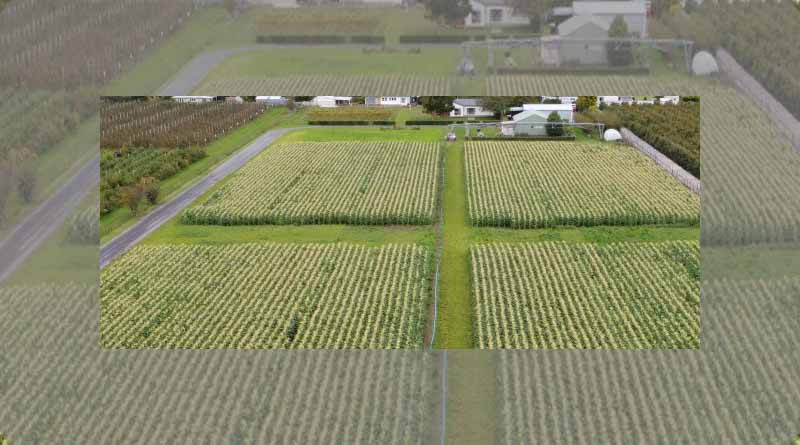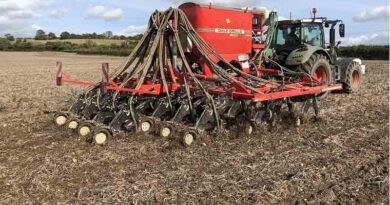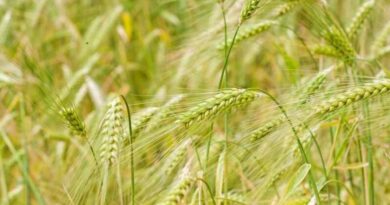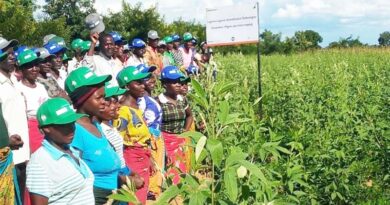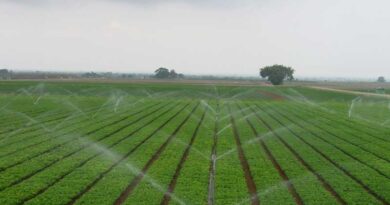Carbon positive – a six-year trial of regenerative cropping
16 August 2023, NZ: Interest in a six-year research programme into regenerative agriculture techniques is sure to increase as growers recover from Cyclone Gabrielle. In partnership with the Hawke’s Bay Future Farming Charitable Trust, LandWISE is running ‘Carbon Positive’, a trial looking at the economic and environmental effects of adopting these techniques in a process cropping system. It is particularly interested in comparing a regenerative production system with conventional systems, and the effects of each on longer-term cropping soils.
Alex Dickson from LandWISE says key questions include finding out if soil carbon levels, other soil health indicators and crop gross margins can be increased. “We are doing a huge amount of measuring of soil, crop and management variables, from soil carbon to 90 cm deep, plant germination rate and population, to the cost of applying slug bait. We anticipate it will take the six years to let the systems fully establish and be able to confidently measure differences.”
To do the research, the LandWISE MicroFarm has been split into three different management systems, conventional versus regenerative, and a hybrid system that cherry-picks elements from the other systems. Four replicates of each are randomly allocated, and each plot is 12 metres wide and 90m long, so standard farm and contracting equipment can operate.
Dan Bloomer from LandWISE says they don’t want to be seen as white-lab-coat boffins being impractical.
“So the whole thing is set up to mimic what real farmers can do. We use the same machinery and contractors that farmers use, and won’t do anything that couldn’t be realistically scaled up to 20 or 200-hectare paddocks. And then we use sound science practice to be sure data we gather is valid and can generate reliable information.”
The conventional approach mirrors the system used by most farmers for the last few decades, using full cultivation, applying mineral fertiliser, and agrichemicals to control pests, weeds and diseases. Soil regenerative practices aim to minimise soil disturbance, keep it covered as much as possible, grow a diverse range of species, and keep living roots in the soil at all times. Global regenerative agriculture often talks about introducing grazing animals, the context being long-term mono-cropping of cereals or cotton for example. In Hawke’s Bay, winter lambs are a normal part of many farm systems.
“That one is still in discussion – our advisory groups see benefits in removing animals, avoiding the soil compaction they cause, and extending the cropping window.”
The regenerative system advisors suggest growing maximum biomass and feeding it to the “earthworms, microorganisms and others that live in the soil” might be a better option.
“It’s a six-year project, and I expect those questions will resolve themselves in time,” says Dan.
Both McCain Foods and Heinz-Wattie’s are involved in the research, alternating annually and growing crops as they would normally. The year 2022–23 was a ‘McCain’ year and sweetcorn was first off the block. The crop was recently harvested and the MicroFarm has been sown in winter cover crops. The year 2023–24 is a ‘Wattie’s’ year, and the chosen crop is to be tomatoes.
The sweetcorn crop was sown late, didn’t have the usual amount of sunshine and was flooded for several days during the cyclone. But it fared better than many Hawke’s Bay crops. While results haven’t yet been analysed, Alex says it seems that the soil regenerative crop yield was slightly lower than the other two, and costs were higher.
“But it is the first crop, and we expect the management changes will take time to bed in. It will be interesting to compare a corn crop again in a few years’ time.”
Other process crops grown during the trial are anticipated to include beetroot, green beans and peas. Cover crops will include ryegrass and several single or multi-species cover crops such as oats, vetch and lupins.
Each system is actively managed with advice from farmers, contractors and industry providers. The Ministry for Primary Industries (MPI), Hawke’s Bay Regional Council, McCain Foods, Heinz-Wattie’s, BASF, Hawke’s Bay Vegetable Growers Association and Hill Laboratories are funding and supporting the research, along with support from the neighbouring marae.
Also Read: Mahindra Tractors launches 7 new models under the OJA range for Indian farmers
(For Latest Agriculture News & Updates, follow Krishak Jagat on Google News)

